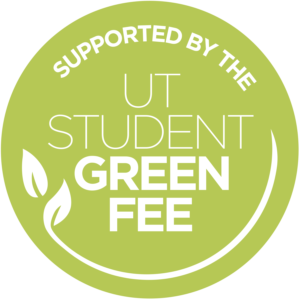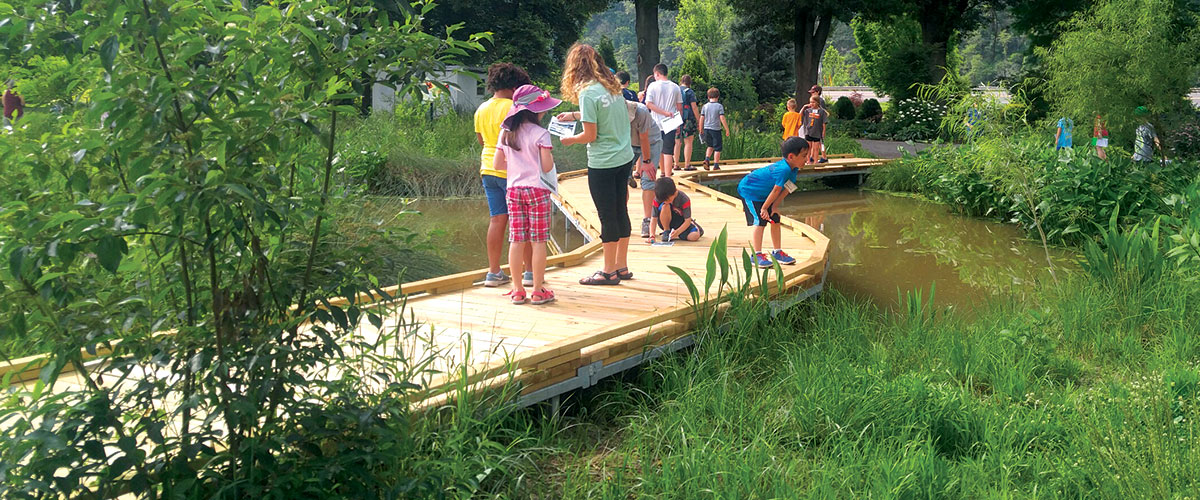
The Student Environmental Initiatives Fund, also known as the “Green Fee,” can be used to fund many different types of sustainability-related projects that enhance the operations at the University of Tennessee, Knoxville. The funds are overseen by the Student Environmental Initiatives Committee (SEIC).
If you have a rough idea you would like implemented or have already thought your idea through and are ready to submit a formal proposal, please fill out the form on this page.
Please see below for examples of specific types of funding requests. Other types of requests to make campus operations more sustainable are always welcome.
Student OrganizationsSubmit funding requests for student organizations doing sustainable outreach and engagement activities. |

Design & Research
Propose a student-led research or design project that will directly benefit operations at the University of Tennessee, Knoxville.

Conference Funding
Attend a sustainability-related conference or workshop. NOTE: Students must first apply for conference funding from the Student Organization Travel Fund: https://go.utk.edu/travelfund/ and show proof of that application and the results of it BEFORE applying for conference funding from the Green Fee. Preference will be given to students who are presenting at conferences or who connect their attendance to beneficial impacts to campus operations.

Water Bottle Refill Station
Propose adding a new refill station to an existing water fountain in your favorite campus building. There is $40,000 allocated each year for this. Generally, this funding is only used for replacing existing drinking fountains in buildings with drinking fountains that have the bottle refill station incorporated in them. Outdoor bottle refill stations or bottle refill stations indoors that do not have an existing drinking fountain are cost-prohibitive and would require a Construction Estimate Request and regular green fee proposal.

Electric or Alternatively Fueled Vehicle Assistance Program
University of Tennessee, Knoxville departments or campus units can apply for supplemental funding for electric and alternative fuel vehicles/equipment.
Quick Facts
Student representatives hold a majority vote on the SEIC
2005
Fee established by SGA vote
~$1,000,000
Amount collected from the fee each year
$10
Per in-state full-time student, per semester
$35
Per out-of-state full-time student, per semester
Resources
Previous Project Highlights
In FY 16, the Office of Sustainability conducted a Hand Dryer feasibility study to provide insight into whether Building Services should switch from paper towel use to hand dryers in high traffic areas. The results of the study showed both a cost savings and workflow efficiency improvement opportunities for Building Services, with greenhouse gas (GHG) emission reductions resulting from reduced transportation of paper towels to campus and then to individual buildings. In May of 2018, the decision was made to use a portion of the rollover money from the Facilities Services FY 18 operating budget to remove the majority of campus paper towel dispensers and replace them with hand dryers in high traffic areas.
The Arboriculture Team at Facilities Services enhanced the University of Tennessee tree inventory database by upgrading to a cloud based tree inventory management software that provides the University access to the tree inventory database through any web enabled device such as tablets and smart phones. This Enterprise version of the software also includes a Community Viewer that allows the public to have read-only online access to the tree inventory database via a web browser.
The Grounds team within the Building Services unit in Facilities Services requested funds to purchase a weather station and supporting software, in addition to running a dedicated electric line to the station. Their findings have resulted in a preference to utilize a weather station that communicates with the Rain Bird irrigation system to ensure no over-watering occurs and excess water is no longer an issue on campus.
Sam Adams, the UT Arborist, requested the Green Fee to fund a purchase a 16″ capacity brush chipper, for the purpose of doubling the amount of wood and brush that can be chipped and used on campus wide composting projects, reducing wood waste going to the landfill by approximately 60%.
With labor donated by the Facilities Services Department, this four-year, $384,000 project supported the installation of new lighting fixtures and controls that use about one-third less electricity and eliminate the need for excessive lighting in the Stokely Management Center (SMC). In addition, the project added daylight harvesting technology to the building so that the lighting dims as sunlight enters a space. These improvements have saved $56,000 a year based on 2003 electric rates.
The Green Portal Project is a program that aspires to connect all sustainability-interested students on campus. By making a profile and filling in your interests, you will be able to see all individuals on campus who share similar interests with you, thereby furthering the connections and strengthening overall environmentalism on campus.

The Grow Lab is a new campus garden that started in Spring 2018. As a living laboratory, the Grow Lab promotes experiential and service learning, demonstrates ecological food production methods, and encourages community engagement. Half of the plots will be designated for specific academic courses, research, and university groups. The remaining plots will be maintained by staff and volunteers with produce donated to hunger-alleviating causes.
To learn more about the Grow Lab visit the official site page.

A 78-foot long boardwalk now spans the middle pool of a created wetland at the UT Gardens. Wetlands are a natural filter for water moving through the landscape. The created wetland receives runoff from an uphill parking area as well as the surrounding manicured gardens, helping to protect the Tennessee River against nonpoint source pollution originating from these areas. For more information, visit tiny.utk.edu/utwetlands.